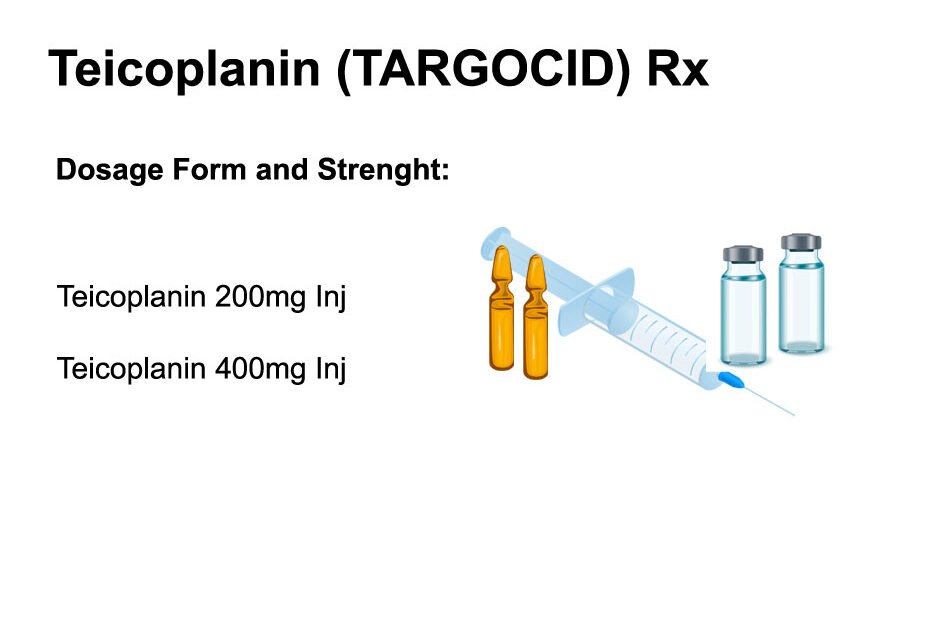Classes
Teicoplanin is a glycopeptide antibiotic
DAE Class; Rx
Common Brand Names; TARGOCID
Description
Teicoplanin is a glycopeptide antibiotic. Teicoplanin is very similar to Vancomycin in mechanism of action and antibacterial spectrum. Teicoplanin is effective against gram positive bacteria. Antibiotics require constant drug level in body for therapeutic effect. This is achieved by taking the drug at regular intervals of time throughout the day and night as prescribed. Teicoplanin is important to take the drug for the full time period as prescribed. discontinuation of the drug, may result in ineffective treatment.
Uses
Teicoplanin is primarily used in conditions like Bacillary dysentery, Bacterial infections, Constipation, Constipation and bowel evacuation, Endocarditis, Endocarditis treatment, GI infections, Potentially serious gram +ve infections, Respiratory tract infections, Septicaemia, Serious infections due to staphylococcus aureus, Skin infections, Soft tissue infections, Urinary tract infection.
Contraindications
Teicoplanin is contraindicated in conditions like Epilepsy, Convulsions, Hypersensitivity.
Side Effects
The severe or irreversible side effects of Teicoplanin, which give rise to further complications include Bronchospasm, Ototoxicity, Renal failure, Eosinophilia.
The symptomatic adverse reactions produced by Teicoplanin are more or less tolerable and if they become severe, they can be treated symptomatically, these include Dizziness, Headache, Fever, Tinnitus, Rashes, GI upset, Hearing loss, Angioedema, Rigors, Reaction at injection site.
Warnings
Teicoplanin should be used with caution in the patient with hypersentivity to vancomycin, Perform regular hematological, liver, renal and auditory tests. Use with caution during pregnancy and lactation.
Pregnancy and Lactation
No Information regarding High Risk Group is available.
Maximum Dosage
Intramuscular, Intravenous
Community-acquired pneumonia, Complicated skin and soft tissue infections, Complicated urinary tract infections, Hospital-acquired pneumonia
Child: ≤2 months Loading dose: 16 mg/kg as a single dose on Day 1. Maintenance: 8 mg/kg once daily starting on Day 2. Doses are given only via IV infusion over 30 minutes; 2 months to 12 years Loading dose: 10 mg/kg 12 hourly for 3 doses. Maintenance: 6-10 mg/kg once daily. Doses are administered via IV inj over 3-5 minutes or IV infusion over 30 minutes; >12 years Same as adult dose.
Intramuscular, Intravenous
Bone and joint infections, Infective endocarditis
Child: ≤2 months Loading dose: 16 mg/kg as a single dose on Day 1. Maintenance: 8 mg/kg once daily starting on Day 2. Doses are given only via IV infusion over 30 minutes; 2 months to 12 years Loading dose: 10 mg/kg 12 hourly for 3 doses. Maintenance: 6-10 mg/kg once daily. Doses are administered via IV inj over 3-5 minutes or IV infusion over 30 minutes; >12 years Same as adult dose.
Intravenous
Continuous ambulatory peritoneal dialysis (CAPD)-associated peritonitis
Oral
Clostridioides difficile infection
How supplied
Teicoplanin is available in injectable form
Inj: 200 mg, 400 mg,
